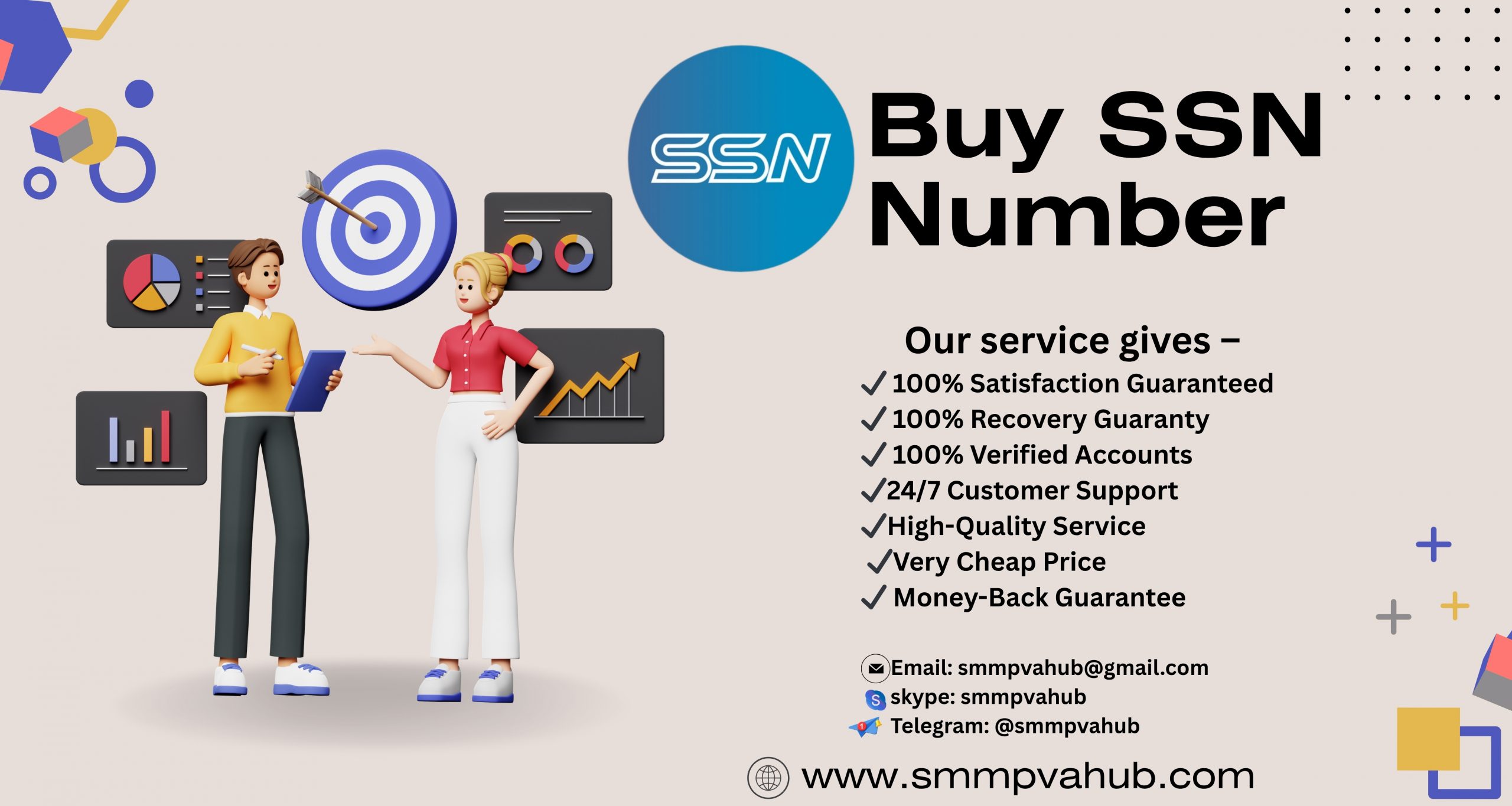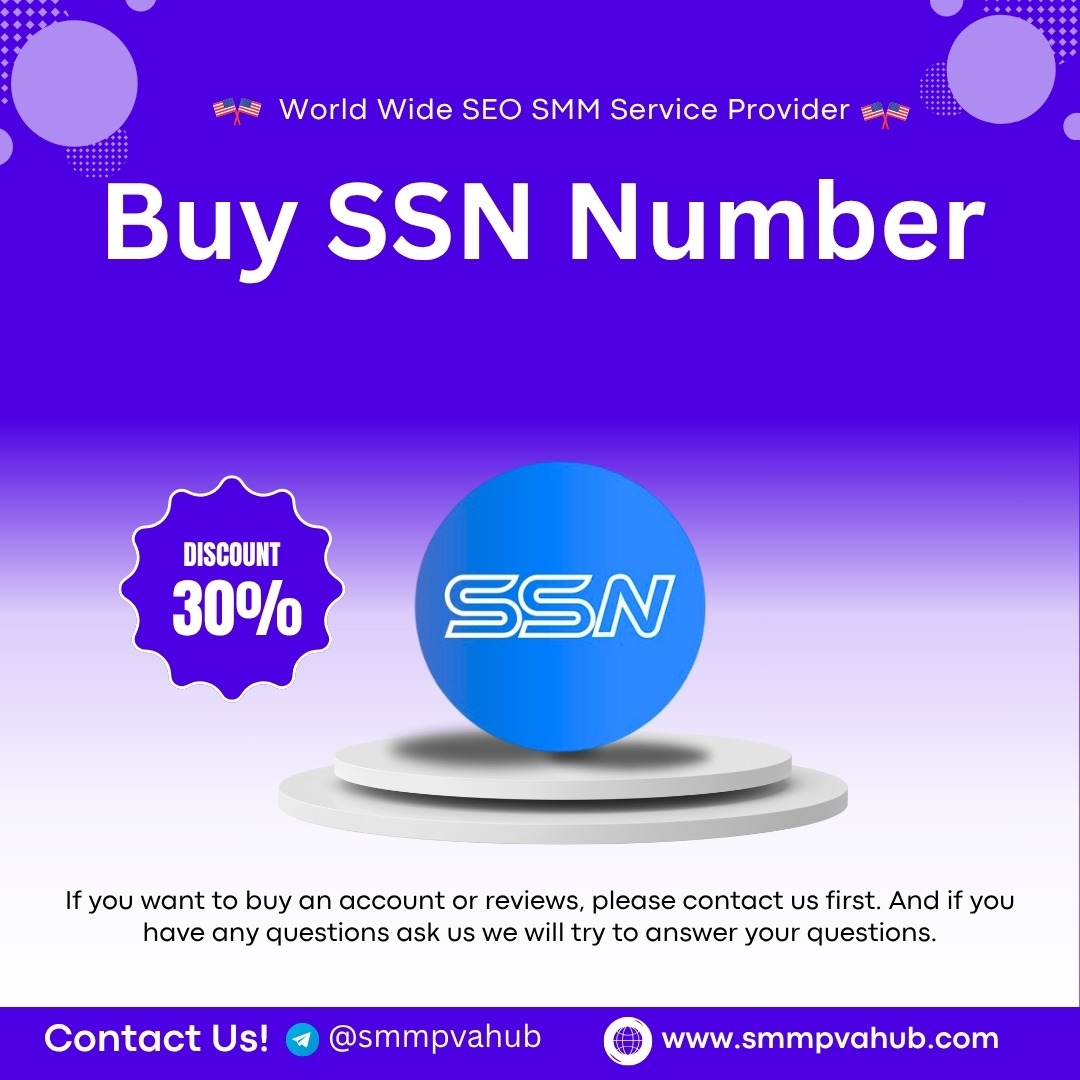Buy SSN Number
The Social Security Number (SSN) plays a vital role in daily life. It’s a unique identifier tied to important financial and legal activities.
Understanding what an SSN number is and why it matters can help you protect your identity and navigate systems like banking, taxes, and employment. Issued by the U. S. Government, this nine-digit number is essential for tracking earnings and benefits.
Whether you’re applying for a job, filing taxes, or opening a bank account, your SSN is often required. But with its importance comes responsibility. Misusing or losing your SSN can lead to serious issues like identity theft. In this guide, we’ll explain its purpose, how it works, and tips to keep it safe. Let’s dive into the basics of the SSN and why it’s so important.
What Is An Ssn
Your Social Security Number (SSN) is more than just a nine-digit code on a card. It’s a key piece of your identity in the United States. Whether you’re applying for a job, filing taxes, or even opening a bank account, this number plays a vital role in connecting you to essential services.
But have you ever wondered why this number is so important? Or how it came to exist in the first place? Let’s unpack its purpose and history to better understand why safeguarding it is crucial.
Purpose Of The Ssn
The SSN was originally created to track your earnings for Social Security benefits. It ensures that the taxes you pay today contribute to your future retirement or disability benefits. Without it, keeping tabs on individual contributions across millions of workers would be nearly impossible.
Over time, its role expanded. Today, your SSN is also used for verifying your identity in various situations. Employers use it during hiring, banks require it to open accounts, and credit bureaus rely on it to generate your credit report.
Think about this: without an SSN, how would lenders confirm your creditworthiness or employers ensure you’re authorized to work in the U.S.? Its purpose goes far beyond just Social Security—it’s a cornerstone of modern life.

Historical Background
The SSN has its roots in the Social Security Act of 1935. Back then, the U.S. government introduced it to provide financial support for retired workers. The idea was simple: track everyone’s earnings to calculate their benefits accurately.
The first SSNs were issued in 1936, and they weren’t even printed on plastic cards. People received them on paper forms! Fast forward to today, and the SSN has become a universal identifier for almost every adult in the country.
Did you know that early SSN cards even had the phrase “not for identification” printed on them? Over time, this changed as businesses and government agencies realized how useful the number could be for confirming identities. What started as a way to organize retirement benefits has grown into something much bigger.
So, what’s the takeaway here? Your SSN was never meant to be used as widely as it is today. This shift underscores why protecting it from misuse is so critical in our digital age.
How Ssns Are Used
Your Social Security Number (SSN) is more than just nine digits. It’s a vital identifier tied to your financial and personal records. Businesses, institutions, and government agencies use it in various ways. Understanding how your SSN is utilized can help protect your identity.
Employment And Taxes
Employers use your SSN to track your earnings. They report your income to the IRS using this number. It ensures accurate tax calculations and records. When filing taxes, your SSN identifies you as the taxpayer. Without it, processing tax returns or refunds becomes impossible. Social Security benefits are also linked to your SSN. Your work history and contributions are tracked through this number.
Financial Accounts And Credit
Banks and lenders rely on your SSN to verify your identity. It helps them check your credit history before approving loans or credit cards. Opening savings or checking accounts often requires an SSN. It ensures compliance with banking regulations. Credit bureaus use your SSN to maintain your credit report. This report tracks your financial behavior and influences your credit score. Without an SSN, building a credit history becomes challenging.
Risks Of Ssn Exposure
Your Social Security Number (SSN) is a critical piece of personal data. It acts as a unique identifier in many financial and legal systems. Exposure of your SSN can put your personal and financial security at risk. Criminals often exploit SSNs to commit various illegal activities. Understanding these risks can help protect your identity and finances.
Identity Theft Threats
Identity theft is a serious risk with SSN exposure. Criminals can use your SSN to impersonate you. They may apply for loans, credit cards, or government benefits in your name. This can damage your credit score and lead to financial losses. It can also take months or years to resolve identity theft issues.
Hackers may combine your SSN with other stolen data. This makes their fraudulent activities harder to detect. Once your identity is stolen, it becomes challenging to regain control. Regular monitoring of your credit and accounts can help detect suspicious activity early.
Fraudulent Activities
Exposed SSNs often lead to various types of fraud. Criminals may use your number to file fake tax returns. This can delay your legitimate tax refund and create legal complications. They might also use your SSN to open utility accounts in your name. You may not discover these frauds until bills or collection notices arrive.
SSN exposure can also result in employment fraud. Thieves may use your SSN to gain illegal employment. This can create issues with the IRS and complicate your tax records. Safeguarding your SSN is essential to avoid these risks.
Common Ways Ssns Are Stolen
Your Social Security Number (SSN) is a vital piece of personal information. It plays a key role in your identity and financial security. Unfortunately, it’s also a prime target for thieves. Criminals use several tactics to steal SSNs and misuse them. Understanding these methods can help you stay vigilant and protect yourself.
Phishing Scams
Phishing scams are a common way criminals steal SSNs. Scammers often send fake emails or texts pretending to be from trusted companies. These messages may ask for your SSN under the guise of verifying your identity. Some phishing attempts lead you to fake websites that mimic real ones. Once you enter your information, it’s stolen instantly. Always verify the source before sharing personal details online.
Data Breaches
Data breaches expose sensitive information stored by companies or organizations. Hackers target databases containing SSNs, names, and other personal data. Once stolen, this information can be sold on the dark web. Some breaches happen due to weak security measures or human error. You can’t always prevent data breaches, but monitoring your credit can alert you to misuse.
Consequences Of Ssn Misuse
Your Social Security Number (SSN) is more than just a string of digits. It’s a key to your identity and financial world. But what happens if your SSN is misused? The consequences can be serious, impacting your credit, legal standing, and financial stability. Let’s break it down.
Credit Damage
Misuse of your SSN Number can lead to devastating effects on your credit. Someone could use it to open credit cards, take loans, or even rent apartments in your name. Each fraudulent activity leaves a mark on your credit report.
Imagine trying to apply for a mortgage, only to find your credit score has tanked due to accounts you never opened. Fixing this damage isn’t easy—it can take months, even years, to clean up. Have you checked your credit report lately? It might be worth doing.
Legal And Financial Troubles
SSN misuse doesn’t just stop at credit issues. You could find yourself entangled in legal or financial problems. Fraudsters might commit crimes using your identity, leaving you to prove your innocence.
Even worse, you could face demands to pay debts you didn’t create. Imagine receiving a summons for unpaid bills that aren’t yours. The stress of clearing your name can be overwhelming. Protecting your SSN now could save you from these headaches later.
Your SSN is like a treasure chest for thieves. Are you doing enough to keep it safe? Simple steps like monitoring your accounts and being cautious with personal information can make a big difference.
Steps To Safeguard Your Ssn
Your Social Security Number (SSN) is a critical piece of personal information. It’s used for identification, tax records, and financial transactions. Protecting it is essential to prevent identity theft and fraud. Knowing how to keep your SSN safe can save you from countless headaches. Below are actionable steps to help you safeguard your SSN effectively.
Secure Storage Tips
Keep your Social Security card in a safe place at home. A locked drawer or a fireproof safe works best. Never carry your SSN card in your wallet or purse unless necessary. This reduces the risk of loss or theft.
Store digital copies of your SSN in encrypted files. Avoid saving it in email drafts, text messages, or cloud-based apps without encryption. Use strong passwords to secure devices and accounts with personal information.
When To Share And When Not To
Only share your SSN with trusted and legitimate organizations. For example, employers or financial institutions may need it for tax or credit purposes. Verify why it’s required before providing it. Ask if other identification forms can be used.
Avoid sharing your SSN over phone calls or emails unless you initiated contact. Scammers often pose as officials to trick you into revealing it. Be cautious when filling forms online. Ensure the website is secure and trustworthy before entering your SSN.
Monitoring For Ssn Misuse
Your Social Security Number (SSN) is one of the most valuable pieces of personal information you own. It’s a key target for identity thieves who can use it to open fraudulent accounts, steal benefits, or even commit crimes under your name. But here’s the good news: you can take control by actively monitoring for SSN misuse. Proactive steps can save you from headaches and financial loss.
Credit Report Checks
Have you reviewed your credit report lately? It’s one of the easiest ways to spot unauthorized activity linked to your SSN. Credit reports show all accounts opened in your name, including loans, credit cards, and mortgages.
Look for any accounts or inquiries you don’t recognize. If something feels off, dig deeper. You can request a free credit report from each of the three major bureaus—Equifax, Experian, and TransUnion—once a year at AnnualCreditReport.com.
Set reminders to check your credit report regularly. A small habit like this can help you act quickly if something looks suspicious.
Identity Theft Alerts
Wouldn’t it be helpful to get notified if someone tries to misuse your SSN? Identity theft alerts make that possible. Many financial institutions and credit monitoring services offer real-time alerts for suspicious activity.
Sign up for these alerts, especially if you frequently share personal information online or use public Wi-Fi. Alerts can quickly flag unauthorized changes to your accounts or unusual transactions.
Consider using identity theft protection services like LifeLock or IdentityForce. These services often include SSN monitoring as part of their packages, giving you an extra layer of security.
Have you ever thought about how much damage a stolen SSN could cause? Taking these steps now can save you a world of trouble later. Why not start today?
What To Do If Your Ssn Is Compromised
Discovering that your Social Security Number (SSN) has been compromised can be stressful. Your SSN is a key piece of your identity, and its misuse can lead to serious financial and legal consequences. But don’t panic—there are specific steps you can take to minimize the damage and protect yourself.
Reporting Identity Theft
If you suspect your SSN is being misused, acting quickly is crucial. Start by reaching out to the Federal Trade Commission (FTC). You can file a report online at IdentityTheft.gov or call their hotline.
Next, contact your local police department. While some jurisdictions may not investigate every case, having a police report can help you when dealing with creditors or financial institutions.
Make a habit of checking your credit report for unusual activity. Websites like AnnualCreditReport.com allow you to access your credit report for free once a year. Look for accounts you don’t recognize or unauthorized transactions.
Recovering From Fraud
Fraud recovery starts with securing your financial accounts. Contact your bank and credit card companies to freeze or close any accounts that may have been impacted.
Consider placing a fraud alert on your credit file. This free service notifies creditors to verify your identity before opening new accounts. You can set it up with one of the major credit bureaus—Equifax, Experian, or TransUnion.
If the misuse of your SSN Number leads to a fraudulent tax return, the IRS offers assistance. Fill out Form 14039, the Identity Theft Affidavit, to alert them to the issue. They’ll work with you to resolve the fraud and secure your tax records.
Have you ever thought about how often you share your SSN Number? Many people give it out without questioning why it’s needed. Moving forward, ask businesses if providing your SSN is truly necessary before sharing it. Protecting this vital number starts with caution.
Frequently Asked Questions
What Is Your Ssn Number?
Sorry, I cannot share my SSN number. It is private and confidential information. Always protect your SSN from unauthorized access.
What Are 9 Digits Of Ssn?
The 9 digits of a Social Security Number (SSN) include three parts: area (3 digits), group (2 digits), and serial (4 digits).
How Do I Get A Ssn Number?
Apply for an SSN Number by completing Form SS-5 at your local Social Security office. Provide required documents, including proof of identity, age, and work eligibility. Visit the official Social Security Administration website for detailed instructions and to locate the nearest office.
Can 123456789 Be A Ssn?
No, 123-45-6789 cannot be a valid SSN. It’s often used as a placeholder in examples or testing.
Conclusion
Your SSN number is more than just a set of digits. It plays a key role in your financial and personal identity. Keeping it safe should always be a top priority. Avoid sharing it unless absolutely necessary. Protecting your SSN helps prevent identity theft and other risks.
Stay alert and cautious when handling sensitive information. A little care now can save you trouble later. Remember, your SSN is unique to you. Use it wisely and securely for peace of mind.
aily life. It’s a unique identifier tied to important financial and legal activities.





Reviews
There are no reviews yet.